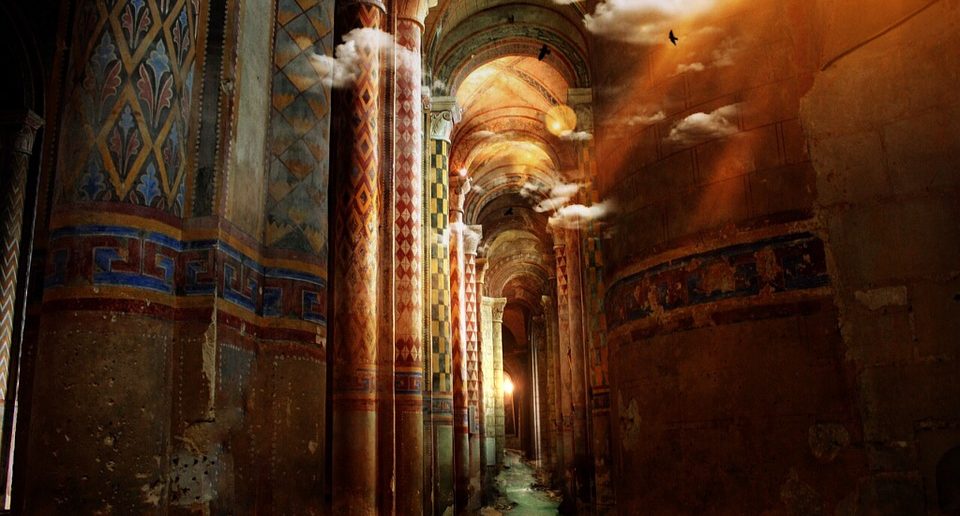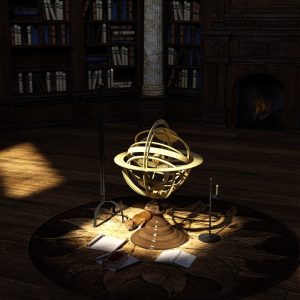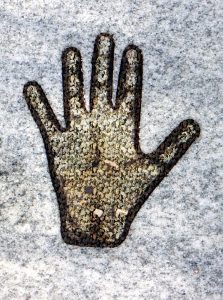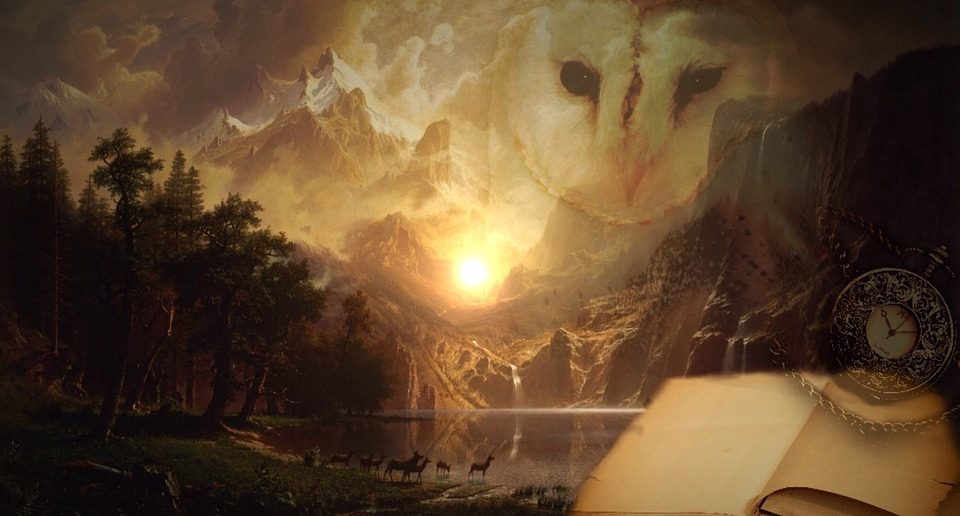“I think it is of great importance to think critically,” Ron Boyd writes. “This very process also led me to recognize not only the limits of scientific inquiry and knowledge, but also the limits of human thought. Acknowledging these limits is the point of departure for discovering the hidden portal to the mystical dimension.”
When I was a little boy, probably around three years old, I took a pair of cuticle scissors and crawled into the narrow space behind the piano. It was there that a lamp for reading sheet music was plugged in. I cut the electric cord to the lamp. There was a sudden flash of bright blue light and then the light immediately went out.
Fortunately for me, the electricity took the shortest route from the positively charged wire to the adjoining ground wire. I was completely unharmed.
Like most small children, I had probably been warned about the dangers of electricity, but lacking any real proof of the power of the energy contained within this seemingly benign wire, it was only a vague concept to my young mind. What I initially questioned suddenly became very real to me.
It is part of our nature as human beings to question. The moment we first began to ask “what if” has shaped our destinies ever since. Spanning the globe across many millennia, the human race has pondered the origin and ultimate meaning of our existence, and in this process has also proposed myriad explanations for our origin and the meaning of our existence.
This quest for understanding has been called the God Problem, for many reasons.

Firstly, even though many adherents of present day monotheistic religions profess a belief in God and the importance of such belief, they often have had difficulty finding common ground.
As a result, many bloody conflicts have arisen between various factions, each claiming to be more favored in the eyes of their God, and more worthy of divine providence than the others. In a nutshell, belief in God equates with excuses for behaving badly. In this paradigm, the struggle between good versus evil is an external one. One where good prevails by destroying the evil “other.” Such notions have played out between tribes, ethnicities, nations, states, and so on in what might seem like an endless display of barbarism, all in the name of God.
Based upon this, one might reasonably conclude that God does not seem as loving as some might suggest, even going so far as to take an interest in the outcome of a football game. God determines the winners and losers, bestowing his favor upon those most deserving, except when foiled by his chief adversary, the devil. Were it not for this cunning adversary and his horde of minions, boundless prosperity, peace, and justice would once again return to the face of this earth. This is quite perplexing, since God is purportedly omnipotent, so it seems a bit strange that He is so impotent and ineffectual in these rather important matters, just when it would seem he is needed most.
The male deity concept, at least in our predominantly Western view, is presented as the great patriarch holding dominion over all things. This male bias, has been used as the justification for the oppression and suppression of many generations of women across numerous cultures. This is another significant portion of the God problem.

In many ancient Goddess cultures, it was the Goddess who gave birth to the world. She was identified as being the source of life. This was evident in many ways, such as giving birth to children and she also was symbolized as producing the bounty of the Earth from which all life springs. This feminine aspect of the divine has been largely absent and silent within the prevailing public discourse in our Western culture, although some remnants of it do remain.
This imbalance has been further manifest in our relationship to the environment. It is wantonly polluted and plundered. We have, over time, diminished what was once considered sacred to the point where its ongoing ability to sustain life has been significantly threatened. Clearly something is wrong. Our current paradigms are failing us, which might suggest why some are rejecting them. If these are rejected, then what takes their place?

The God problem can be resolved by rejecting religion and any notion of God entirely.We live in a time when scientific fact has shaken the foundations of many traditional religious beliefs. For some, religion is an outmoded way of thinking that is largely superstitious and rooted in ignorance. If we choose to use science and reason to supplant faith, does this mean we have eliminated any potential for abuse? Does our capacity for evil then become non-existent? Do matters of ethics and morality suddenly resolve themselves?
By asking these questions, I do not mean to imply non-believers would suggest this to be the case. Instead, I mean to point out the importance of having a well-considered moral framework in place.
Within philosophy, it is understood that any expression of what a person’s behavior “ought” to be, is deemed to be a moral statement. Between various disciplines, there is a need for each to critically examine the others’ ideas, processes, implementation of policies, and the potential ramifications of actions taken. So, in this regard, I would suggest it is necessary for religion and science to have an ongoing dialogue. Just as science must question some of the beliefs and tenets of religion, so too must religion question the moral implications of scientific advances and the ethical application of them.
Science in and of itself is not morally superior. Science has produced the most lethal creations ever devised. Chemical weapons, nuclear weapons, biological weapons, land mines, and assault weapons. It has produced toxic chemicals which pollute our environment. It has magnified our ability to ravage the planet’s resources. Our combined emissions are now contributing to an increase in global temperatures, resulting in melting glaciers, rising ocean levels, and dramatic changes in weather patterns, upsetting the balance of many fragile ecosystems. Science can be as much of a problem as it can be a solution, just as with religion.
Aside from some of the seemingly strange beliefs and practices in various faiths, religion can also be a force for good in many people’s lives. A community serves as a means of mutual support. Many of the faithful either contribute to charities or engage in volunteer work as an extension of their belief system. This is, at the very least, the pragmatic approach, and we have yet to really delve deeply into the God problem.
I think that ultimately we would want to know what is true. In my own journey, I myself have grappled with the God problem, and up to a point had considered it to be unknowable. Understanding the nature of the problem, I offer some ideas for your consideration.
 In our attempts to conceptualize, we come up against the limitations of our languages. Language is itself an abstraction. We use it to convey the sense of what we mean, but it is ultimately reductionistic and fairly vague. As an example, if I were to ask each of you to picture the image of a dog, it is quite possible each of you would describe a different type of dog. One a German Shepherd, another a Chihuahua, and someone else a Saint Bernard. Each a different size, each a different color, each with different temperaments, and so on. But which person’s image is right? Which is the true dog? They are all correct in the general sense, so no answer is necessarily better than another. Now if I were to ask which is the best dog, I could potentially be stirring up trouble as each person passionately makes the case for their canine of choice. These are subjective viewpoints, and to answer it objectively would be difficult because each of them may or may not be better depending upon the context in which they reside. This one is a good guard dog, this one is good with children, or this one is good for hunting and tracking.
In our attempts to conceptualize, we come up against the limitations of our languages. Language is itself an abstraction. We use it to convey the sense of what we mean, but it is ultimately reductionistic and fairly vague. As an example, if I were to ask each of you to picture the image of a dog, it is quite possible each of you would describe a different type of dog. One a German Shepherd, another a Chihuahua, and someone else a Saint Bernard. Each a different size, each a different color, each with different temperaments, and so on. But which person’s image is right? Which is the true dog? They are all correct in the general sense, so no answer is necessarily better than another. Now if I were to ask which is the best dog, I could potentially be stirring up trouble as each person passionately makes the case for their canine of choice. These are subjective viewpoints, and to answer it objectively would be difficult because each of them may or may not be better depending upon the context in which they reside. This one is a good guard dog, this one is good with children, or this one is good for hunting and tracking.
If we have this much difficulty discussing the merits of something as commonplace as a dog, it is no surprise that having an in-depth discussion about a subject as complex as the nature of God can be so contentious. (I am reminded here of the joke about the agnostic dyslexic who was up all night pondering whether or not there really is a dog.)
The next issue is the anthropomorphic problem. The tendency of humans to attribute human qualities or characteristics to what we call God. If you listen closely to various preachers’ vehement condemnation of any who might happen to disagree with their particular brand, and read between the lines, you’ll soon realize that what they proclaim as the utterances of God, are in fact their own fears and hatreds projected outward. They put their own viewpoints on such a high pedestal that they come to take the place or obscure that which might truly be a reflection of God.
Since the advent of telescopes and ongoing advances in our understanding of astronomy, we now know that we are no longer at the center of the universe and that we occupy an almost infinitesimally small corner of it. The old man in the sky notion of God, has lost its relevancy and even seems a bit naive. One idea is that of the first mover, that God set things in motion but is no longer actively engaged in the events which occur. The Big Bang occurred, and following predefined laws the universe continues on the path set before it.
For some, this notion of God is too cold and impersonal. They seek a god more involved and engaged in our day-to-day lives. While there is no direct or concrete evidence of it, they see it in small actions, people reaching out to help another, extending love and light in a world with not enough of it.
I consider the contemplation of such ideas a worthwhile exercise, however they still remain conceptualizations. How then might we possibly move beyond these?
 The problem with either belief or disbelief lies in not knowing. Once we obtain direct knowledge of something, belief becomes irrelevant. As with my encounter with electricity, it was no longer a vague abstract concept, but some very real and tangible. I knew at that moment that this energy was very real, even if I lacked a complex understanding of it. With my college background in electronic engineering, I know even more now about this incredible power and have a greater appreciation for its profound depth and complexity.
The problem with either belief or disbelief lies in not knowing. Once we obtain direct knowledge of something, belief becomes irrelevant. As with my encounter with electricity, it was no longer a vague abstract concept, but some very real and tangible. I knew at that moment that this energy was very real, even if I lacked a complex understanding of it. With my college background in electronic engineering, I know even more now about this incredible power and have a greater appreciation for its profound depth and complexity.
If we are to progress in our understanding, we cannot allow ourselves to get wrapped up in dichotomous thinking. Thinking logically and using critical analysis, is useful up to a point. For Plato, this was the dialectic, the process of analysis, the contrast of thesis versus antithesis. This meant constructing an argument, point versus counterpoint. It was in the analysis that one would find the flaws in one’s own assumptions slowly chipping away at the ego. For Plato, the dialectic process was also the means to enlightenment.
What you will likely discover as you probe deeper into the labyrinth of the mind, is the recognition of paradox. The more comfortable you become with paradox, the closer you become to real insight and understanding. Using some commonly held beliefs, I will give some God paradoxes. That is, assuming these statements are true, we reach inherent contradictions.
- God is omniscient. God knows all things that will occur. If all possible outcomes are known, then there is no free will, and therefore no sin and no need for heaven or hell.
- God is omnipotent, or all-powerful, meaning God is capable of anything. Can God die? If God cannot become powerless, then this is also a limitation of his power.
I recall once asking a fundamentalist Christian one of these questions, they did not have an answer for me, and did not want to answer the question, even though they agreed with the premises. They simply said, “We’re not supposed to ask such questions, we just have to believe and have faith.”
But I have also seen the same resistance to question in those who choose not to believe, with responses such as it is not knowable and not worth reflecting upon.
For both though, I would say the same thing. The point of the dialectic, thesis and antithesis, is the confrontation not with others but with oneself. What is lacking is your awareness, and there is only one path to it, and that is through yourself, through your own labyrinth of the mind.
In mathematics we do the same sort of thought problems and exercises, and deal with many very similar paradoxes. We deal with the concept of infinity, we deal with negative numbers, we deal with imaginary numbers. Numbers themselves are an abstraction, as words are also an abstraction. They are not measurable as tangible things. We made them up. They are mental constructs, but they act as a utility, and they are immeasurably useful to us.
Discoveries in advanced mathematics typically have no real world applications at first, but as we advance technologically we find places where they are applicable. In the formulas used in my electronics courses we would use imaginary numbers in our equations. The name “imaginary number” was actually coined in the 17th century as a derogatory term, as such numbers were regarded by some as fictitious or useless, but today they have a variety of essential, concrete applications in science and engineering.
With the concept of infinity, we could say that the numbers are infinite, that they extend in both directions on a number line, both positive and negative, to infinity. However if we take only the even numbers or odd numbers, we have half as many, but yet both infinitely large sets. Contemplating this sort of conundrum, became the basis of what we now call set theory in mathematics and has many real world applications, in fields such as biology, chemistry and physics, as well as in computer and electrical engineering.
In examining these concepts we are touching on several areas of philosophical study, epistemology, ontology, and logic. The first deals primarily with how we know what we know what is real. Ontology is about what it means for something to be real or exist, and logic concerned with the process of analyzing arguments to test their validity.
Taking some of our concepts further into a more personal and human level, we must also ask ourselves about such things as love, beauty, and justice. Again, these are internal experiences arising from our of interactions with each other, or from walking in nature, or perhaps by listening to music. We consider these thoughts and feelings equally valid in our experience, perhaps even more valid.
These are the experiences which ultimately give life its meaning, meaning which we would not have without the experience. Undoubtedly, life is difficult, life is a struggle. Sometimes life evokes the resources and strength which we might have never known we possessed. Just as there are the profound lows in life, and all the in-betweens, there is also the possibility of transcendence.

I am a mystic. I have, in general, avoided discussing the actual experience of mystical union, universal consciousness, or transcendent knowledge. These are but a few of a multitude terms that could be used to describe such an experience. I have been apprehensive about discussing it for a number of reasons.
For one, the term “mystical” carries a lot of connotations. These have been distorted through sensationalistic books, movies, and television shows. I have a great interest in science, and think it is of great importance to first be skeptical and to think critically, and I understand and accept the importance of this process. However, it is this very process that also led me to recognize not only the limits of scientific inquiry and knowledge, but also the limits of human thought. Acknowledging these limits is the point of departure for discovering the hidden portal to the mystical dimension.
For some, such knowledge may seem to be unattainable. How could one know such profound truths and have such incredible insights? To the skeptic, it seems so outrageous as to strain credulity. The only people who would claim such things, must be charlatans, hustlers, or maybe just plain nuts.
I did not set out to be a mystic, it was hardly on my radar, and I too only had a vague notion of what it meant. At the time, I was a passionate skeptic and also an agnostic, but there was one thing I sought more fervently than anything, and that was truth. I didn’t want something that was secondhand. I didn’t want another subjective opinion.
It is in this search for truth that we find a paradox. It is the subject-object paradox. In the West, we tend to see the truth as being out there, in objective, measurable facts. In the East, they have tended to the see the truth as being within. It is only recently though that humanity has come full circle and the two seemingly divergent paths have come full circle and have begun to bump into one another.
It is the subject-object paradox which must ultimately be transcended, however. This is the idea from Buddhism and Hinduism called non-duality, that the sense of oneself as being separate and distinct from what appears to be external is ultimately an illusion. There is an unreality of reality, they would call this maya, or illusion. Everything is transitory, temporary. Much of what is true for today, will be gone tomorrow. On a cosmic scale our lives are but a brief flash in the grand scheme of things.
It is probably more useful for our purposes to see the universe in terms of consciousness manifest. The universe is not merely large inanimate chunks of rocks floating through space and time. On a fundamental level, it is much more than that. The progression of life that evolved from its most basic forms to the sophisticated creatures that we are today is a natural outcome, provided that ideal conditions are met. We are the universe contemplating its own existence.
When Einstein proposed his famous equation E=mc^2, it essentially demonstrated that energy and matter are essentially two sides of the same coin. They are the same thing, but we perceive them differently. So too with consciousness, it is interwoven into the fabric of the universe, although not in our common understanding of it.
As an analogy, we could look around the room at virtually all the objects, including the building itself, and even the cars we came here in as manifestations of consciousness. We know for a fact that each of them originated first of all as a thought, as a concept, and then proceeded from there to become the reality that we now see. Underlying the creation of many of these objects is complex mathematics coupled with universal laws of physics without which they could not be made. This is the unmanifest becoming manifest. This is like the artist when asked where the idea for her creation came from, replying with “I really don’t know, it just came to me, it’s a really a mystery.” We are not the originators of consciousness, we are merely the vehicles that carry it.
With the aid of science, we are writing the new story of creation and the old paradigms no longer work for us. In the new story of creation, we actively participate in the creative process, we are co-creators of the present and future reality.
In the creative process is another inherent paradox. One cannot create without simultaneously destroying, for what preceded it must be changed, altered, and transformed, and so it is with us also. For each forward advancement that we make in our development requires us to give up our former self, stripping away layer after layer until we come to the core of or being, the true nature of ourselves, which is divinity itself.

To the mystic, the God problem seems as absurd as denying your own existence. And what is the form of God, but both form and formlessness, changing and changeless, fullness and emptiness, finite and infinite, being and yet non-being.
This is the God problem, the seeming elusiveness, that makes it difficult to grasp. To define it, to give it a name, a gender, a form, a quality, an attribute, to make it a concept, each of which obscures this reality.
It speaks to you in every moment, and still you cannot hear it.
If what I say is true, if such knowledge is possible, of what benefit is it?
I would say that fundamentally we are all one, our separateness is ultimately an illusion. If I hurt you, I hurt myself. It is not in my best interests to be selfish. This is not always immediately obvious, but in the larger picture it most certainly is true. Magnification of the self is ego, and is an impediment to growth, and whether you are aware of it or not, it is not in your best interests to be self-serving. It is like the pagan principle of doing intentional harm, it will return to you threefold. Learning lessons sooner, rather than later, will reduce your own suffering and likely reduce the suffering of those around you, as they will not be pulled into your drama.
You will focus less on conflict, and more on conflict resolution, as both sides are better served with a peaceful resolution.
You will live more in the moment, and be happier as a result.
You will not fear adversity, since it is your teacher.
Everything happens for a reason, and if you are open to this, in time you will understand, and you will find peace.
No one is perfect, and if there is to be redemption, they must be given the opportunity.
We have a lot of potential, if only we would live up to it.
We need more than one lifetime to learn all that must be learned.
Lastly, God is unreasonably patient.






